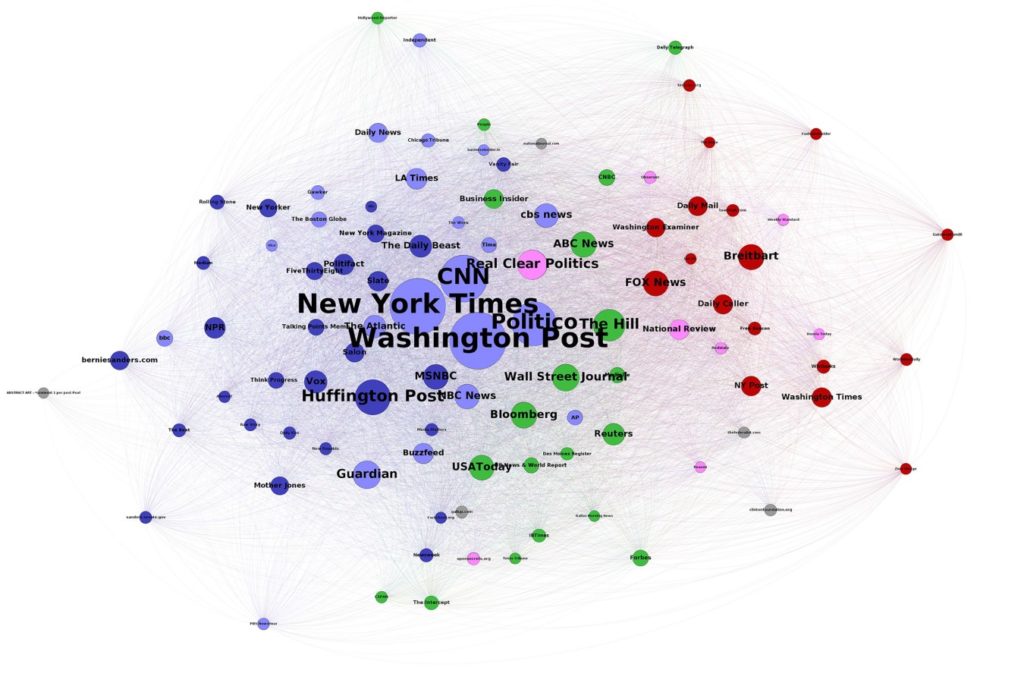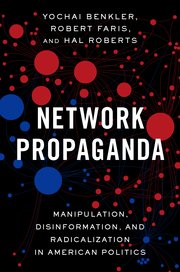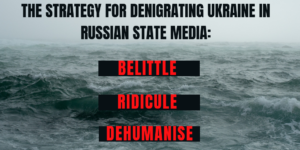
This model shows one instance of asymmetric polarization drawn from the top 100 most-cited media sources. The blue represents left-leaning media outlets, green show centrist media outlets, and red are right-leaning outlets. (Credit: Harvard Gazette.)
What role do the interplay of new and old media play in getting authoritarian demagogues elected? How do new media platforms supercharge the spread of conspiracy theories and false ideas? Is there something different about the way Facebook and Twitter spread hate and lies? How can we stop them from doing so? asks Anya Schiffrin, an adjunct faculty member at the School of International and Public Affairs at Columbia University.
In Network Propaganda: Manipulation, Disinformation, and Radicalization, Yochai Benkler and his co-authors Robert Faris and Hal Roberts have produced an authoritative tome that includes multiple taxonomies and literature reviews as well as visualizations of the flow of disinformation, she writes for The American Prospect:
They begin by sorting out the different types of disinformation and the groups that circulate it. These include “clickbait fabricators” with mainly financial motives for circulating false or misleading content; Russian hackers who spread propaganda via Facebook; Cambridge Analytica, which used data from Facebook profiles to micro-target voters with political advertising; and “white supremacist and alt-right trolls” who harnessed the power of the increasingly powerful “right-wing media ecosystem.” RTWT
 But the larger message from Network Propaganda‘s analyses is that we’re fooling ourselves if we blame our current culture’s vulnerability to disinformation on the internet in general or on social media (or search engines, or smartphones) or even on Russian propaganda campaigns, notes Mike Godwin (@sfmnemonic), a distinguished senior fellow at the R Street Institute.
But the larger message from Network Propaganda‘s analyses is that we’re fooling ourselves if we blame our current culture’s vulnerability to disinformation on the internet in general or on social media (or search engines, or smartphones) or even on Russian propaganda campaigns, notes Mike Godwin (@sfmnemonic), a distinguished senior fellow at the R Street Institute.
Furthermore, Network Propaganda provides strong reason to believe that reforming or regulating or censoring the internet companies won’t solve the problems they’re being blamed for, he writes for TechDirt. True, the book expressly endorses public-policy responses to the disinformation campaigns of malicious foreign actors as well as reforms of how the platforms handle political advertising. But, the authors insist, the problem isn’t primarily the Russians, or technology—it’s in our political and media cultures.

Credit: eu vs disinfo
Network Propaganda expressly places the American problems in the context of the larger currents around the world to blame internet platforms in particular for social ills, he adds:
“For those not focused purely on the American public sphere, our study suggests that we should focus on the structural, not the novel; on the long-term dynamic between institutions, culture, and technology, not only the disruptive technological moment; and on the interaction between the different media and technologies that make up a society’s media ecosystem, not on a single medium, like the internet, much less a single platform like Facebook or Twitter. The stark differences we observe between the insular right-wing media ecosystem and the majority of the American media environment, and the ways in which open web publications, social media, television, and radio all interacted to produce these differences, suggest that the narrower focus will lead to systematically erroneous predictions and diagnoses. It is critical not to confound what is easy to measure (Twitter) with what is significantly effective in shaping beliefs and politically actionable knowledge in society….”
“Different countries, with different histories, institutional structures, and cultural practices of collective sense-making need not fear the internet’s effects,” the authors add. “There is no echo chamber or filter-bubble effect that will inexorably take a society with a well-functioning public sphere and turn it into a shambles simply because the internet comes to town.”







